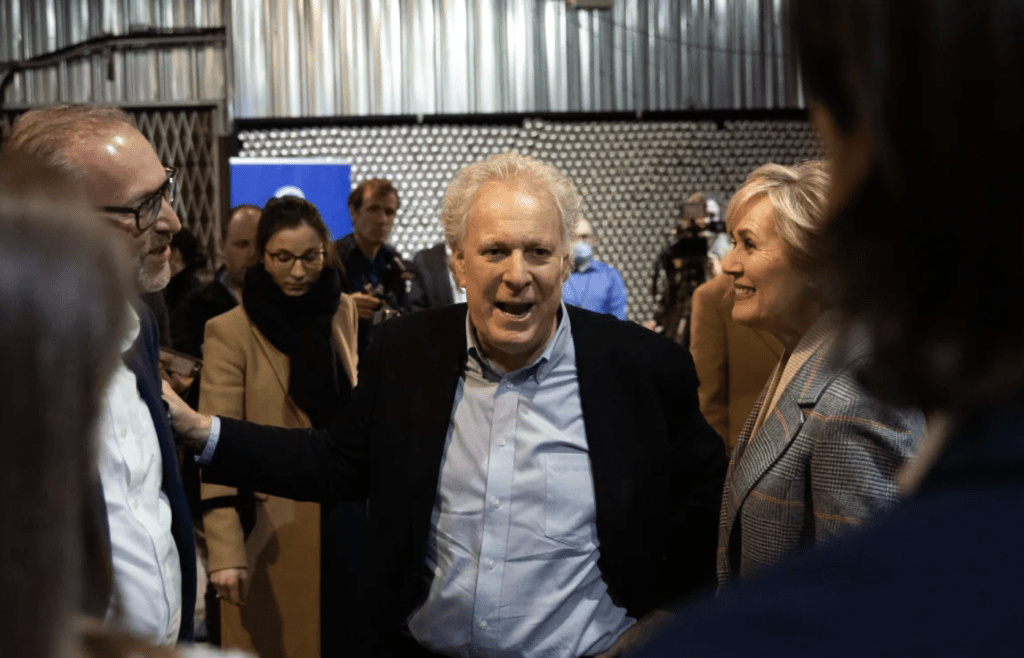Le Revenant: The Conservative Reincarnation of Jean Charest
 CBC
CBC
Lisa Van Dusen
March 11, 2022
The first time I met Jean Charest was one of those fleeting encounters that happen all day, every day in politics. I was a 22-year-old kid, escorting a Quebec cabinet minister on a visit to Charest’s riding, and as the local MP, Charest met the minister’s Challenger at Sherbrooke airport.
In an unforgettable bit of political protocol flouting, Charest pulled up in a classic beater — it may have been, or may as well have been, a decade-old Tercel — that, if I remember right, he’d been driving since law school. The minister in question having been a bit of a diva with a fondness for stretch limos, there was a conspicuous display of side-eye. On the 20-minute drive to the event, Charest was funny, self-deprecating, grounded and displayed a refreshing lack of the sometimes crackpot deference paid in such moments, charming the VIP riding shotgun with a mix of cheeky irreverence and local colour.
Within a year, Charest was the youngest cabinet minister in Canadian history. In 1993, he was recruited to lead the Progressive Conservative Party out of the post-Mulroney wilderness. Five years later, he was recruited by the Quebec Liberal Party amid a wider “draft Charest” push for him to make the leap to provincial politics as the great federalist hope against his former Conservative cabinet colleague and popular Parti Québécois Premier Lucien Bouchard. (Toiling as the token Canadian on a US wire service desk in Washington on the day Charest announced that decision, I was conscripted to bang out a piece explaining for understandably baffled Americans the ins, outs, evolved allegiances and federalist-vs-indépendantiste intricacies of that epic in 600 words). He served as Liberal premier of Quebec from 2003 to 2012.
In an unforgettable bit of political protocol flouting, Charest pulled up in a classic beater — it may have been, or may as well have been, a decade-old Tercel — that, if I remember right, he’d been driving since law school. The minister in question having been a bit of a diva with a fondness for stretch limos, there was a conspicuous display of side-eye.
Charest’s unique strength is an ability to unify in the name of a larger purpose. Which is why the tag line of his campaign for the Conservative leadership, “Built to Win” confounds. First of all, no candidate for any elected office should 1) Presume to have a lock on the support of voters in a democracy before a campaign to secure that support has been run, and, 2) Tout his or her own winnability rather than have credible third-party endorsers do the touting so as not to violate the sanctity of 1). Second, Charest can’t win unless he subdues the rogue elephant in the room, which is the current Conservative Party’s repetition compulsion for choosing leaders whose tactical debt to the party’s social conservative wing makes them nationally unelectable. Winning would require unity that transcends the party’s entrenched split. As it happens, snatching unity from the jaws of defeat is the strength that offsets Charest’s most potent negative, that he is a former Liberal premier of Quebec — not for a cup of coffee but for almost a decade — returning to the federal Conservative Party in a bid to lead it. So, unity should be his brand at this stage, not winnability. The second can’t be achieved without the first. First unity, then winning, then unity gets much easier.
Repeating that he’s a Conservative as often as he can is not a substitute for an explanation of Charest’s Conservative-Liberal-Conservative trajectory and it only undermines the message of his career that there are times when principle comes before labels. The truth is the best answer to the question of his political evolution: That there are moments when greater challenges transcend partisan affiliations. Keeping the country together was one of those challenges. Preserving democracy amid an assault of propaganda and tactical division is another.
The message Charest delivered Thursday night in Calgary, that “If Canadians are not together around the same table, this country is not going to meet its potential,” is one that matters, and that will elevate the debate, win or lose.
Lisa Van Dusen is associate editor of Policy Magazine. She was Washington columnist for the Ottawa Citizen and Sun Media, international writer for Peter Jennings at ABC News, and an editor at AP National in New York and UPI in Washington.
